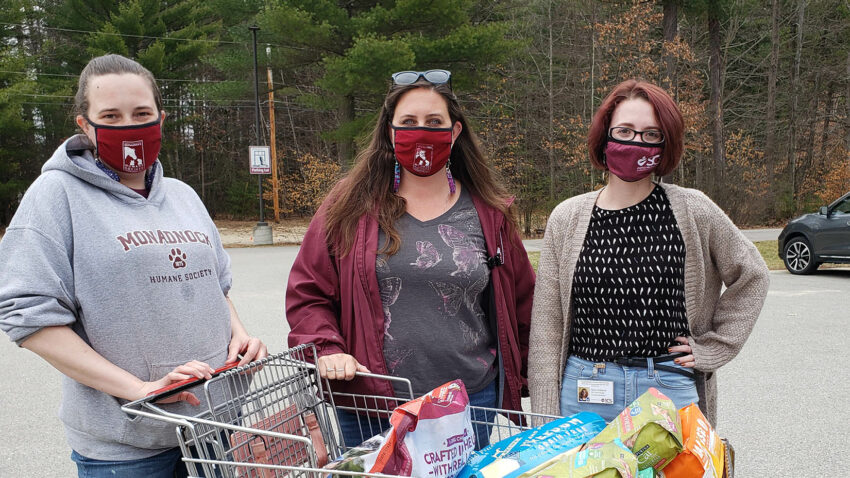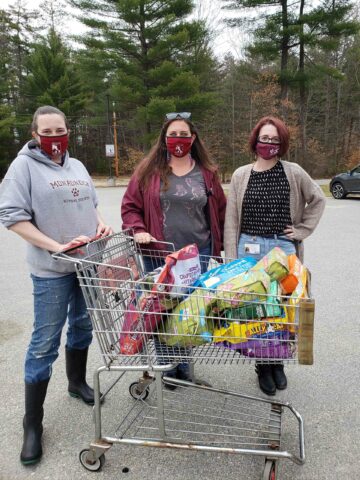

The idea of starting a food pantry for the pets of families experiencing difficult life/financial circumstances began sometime in the mid-2000’s. Monadnock Humane Society’s (MHS) Pet Food Pantry was set up to provide short term support for families living in Cheshire county who would otherwise not be able to feed or care for their pet. Keeping pets with their families is, perhaps, more important during these difficult times than when times are good. Keeping pets with the families they love (and who love them) has made this an extremely important program, recognized not only by local citizens, but also by local companies like C&S Wholesale Grocers and UNFI who donate generously to keep the pet food shelves stocked.

With the recent pandemic, the need for the MHS Pet Food Pantry became even more apparent in our community, especially to those individuals who are served by a local organization – Southwestern Community Services (SCS). SCS is a nonprofit community action program serving Sullivan and Cheshire counties. The organization comprises multiple assistance programs, including fuel and electric assistance, weatherization for homeowners, WIC services, food distribution, Head Start preschool, and affordable housing properties. Sierra Hubbard, case manager for the supportive housing program at SCS, had heard about the MHS Pet Food Pantry and reached out to Emily Kerylow, MHS Shelter Operations Director. This past December, she shared her idea to come together to deliver pet food from the MHS Pet Food Pantry to certain clients in her program. A significant partnership began – one that perfectly aligned with the MHS mission to strengthen the animal-human bond.
The clients in this SCS program utilize multiple rental assistance programs – some long-term and others for only a couple of years. They are varied in age, household composition, disability, and financial status – though most of them are on a fixed income via Social Security benefits, cash assistance through the state, or a combination of both. Another thing nearly all of these clients have in common is a lack of transportation. Less than a third of the participants in Cheshire County have a vehicle which can be severely limiting in this corner of the state. One that, in combination with the financial hardships, creates a logistical complication for pet care.
While MHS has not seen a significant increase in the number of families served in the past year (almost 90 families participated in the Pet Food Pantry program in 2020) there are already over 60 families utilizing the program in the first few months of 2021. MHS frequently makes pet food deliveries on an as-needed basis to people and other organizations in the community, but this is the first partnership that was set up on a recurring basis. Emily and Sierra have a set schedule and are committed to helping on a regular basis.
Since the pandemic began more than a year ago, the world has retreated indoors and leaned heavily on technology that isn’t available to everyone. Reducing the spread of the virus has been – and continues to be – a priority, but some people have fallen through the cracks during this time. Sierra’s clients are housed, but not everyone has internet access or a working phone. This has created additional barriers to accessing services, both logistically and mentally. Daily tasks, in the COVID era, may be easy for some, but not everyone is equipped to handle it.
Sierra adds that another reason the MHS Pet Food Pantry is a wonderful resource is that getting to Swanzey themselves is extremely difficult for her clients. She says that making pet food accessible is just one more thing that helps them focus on and maintain their housing, which is the goal of SCS. Finding other community resources that can relieve some financial pressure truly helps. Something as small as a bag of pet food can make a difference to people on a fixed income.
There is another less obvious benefit of this program – emotional support. Not all domestic animals are pets, in the traditional sense; sometimes they become emotional support animals for people with disabilities. Unlike service dogs, which are trained to perform a task that mitigates a disability, emotional support animals can be “prescribed” by medical professionals who determine the animal relieves a person’s symptoms from conditions such as depression, PTSD and anxiety. Sometimes you’re helping people take care of a pet, and other times you’re helping them keep an animal that comforts them in moments of crisis, and that can be crucial for people who suffer from major mental health conditions.
Sierra and Emily are excited and grateful to be able to make this resource available to people who need it. And, it’s been extremely successful thus far. Emily’s hope moving forward is that MHS can continue to expand this program – to be able to service more clients who do not have transportation to come pick up food and be able to provide additional resources to those in need (expand to include cat litter, other supplies). As we look into the future and how we all work together to serve the community in new ways, the partnership between SCS and MHS is one of many ways that we begin that journey.
Contributing writer: Sierra Hubbard, SCS Case Manager
If you or someone you know needs pet food assistance, please call MHS at 603.352.9011, ext. 101
If you would like more information about Southwestern Community Services, please visit their website: www.scshelps.org.

